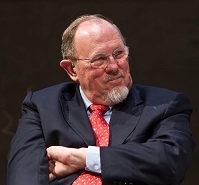Philadelphia, PA, May 9, 2016—The Wharton-Jacobs Levy Prize for Quantitative Financial Innovation will be awarded to Nobel Laureate William F. Sharpe at  the Spring Forum of the Wharton School of the University of Pennsylvania’s Jacobs Levy Equity Management Center for Quantitative Financial Research. The event will be held May 20, 2016 at the New York Hilton Midtown.
the Spring Forum of the Wharton School of the University of Pennsylvania’s Jacobs Levy Equity Management Center for Quantitative Financial Research. The event will be held May 20, 2016 at the New York Hilton Midtown.
“We are thrilled to honor Bill Sharpe with the Wharton-Jacobs Levy Prize,” said Wharton School Dean Geoffrey Garrett. “His research has made a lasting impact in the field of investment management and he is truly deserving of this award.”
Sharpe will discuss his work in returns-based style analysis, for which he is receiving the Prize. Other scholars will present research on topics including asset manager funds, behavioral economics and global stock selection models. The program will bring faculty, students and finance professionals together to explore practical applications of research in quantitative finance. The event will conclude with a cocktail reception in Sharpe’s honor.
“Bill Sharpe’s work in the area of style analysis is particularly meaningful,” said Professor Christopher Geczy, Academic Director of the Jacobs Levy Center. “His model was widely implemented across the industry and in academia, and continues to be used today.”
Sharpe first presented a model in a 1988 article that used return patterns to determine a portfolio’s exposure to investment style characteristics such as large-cap growth or small-cap value. In a 1992 paper, he went on to show how to use such a model to determine an investor’s effective overall asset mix and compare it to a desired benchmark (“Asset Allocation: Management Style and Performance,” The Journal of Portfolio Management).
A committee of academics and financial practitioners selected Sharpe to receive the Wharton-Jacobs Levy Prize, an $80,000 award. He is the STANCO 25 Professor of Finance, Emeritus at Stanford University’s Graduate School of Business. In 1990, he received the Nobel Prize in Economic Sciences along with Harry Markowitz and Merton Miller for their work in the theory of financial economics.
“Bill Sharpe’s insights make up a large part of the foundation of modern finance,” said Bruce Jacobs, who served as Chair of the selection committee. “His work has been of enormous benefit to investors, from managers of large pension funds to individual retirement savers.”
The Wharton-Jacobs Levy Prize is endowed with a $2 million gift from Bruce I. Jacobs G’79, GrW’86, PAR’10 and Kenneth N. Levy WG’76, G’82, Principals and Co-Founders of Jacobs Levy Equity Management. It is awarded biennially to recognize excellence in quantitative research that has contributed to a particular innovation in the practice of finance.
For an agenda and information about Forum speakers visit: https://jacobslevycenter.wharton.upenn.edu/spring2016agenda/
About the Jacobs Levy Center
The Jacobs Levy Equity Management Center for Quantitative Financial Research is dedicated to the advancement of quantitative finance, at the intersection of theory and practice, through the creation and dissemination of innovative knowledge. The Jacobs Levy Center aims to enhance understanding of financial markets through the application of quantitative and statistical techniques and methods to such fields as asset management and security pricing, including the analysis of stocks, bonds and other instruments.
About the Wharton School
Founded in 1881 as the first collegiate business school, the Wharton School of the University of Pennsylvania is recognized globally for intellectual leadership and ongoing innovation across every major discipline of business education. With a broad global community and one of the most published business school faculties, Wharton creates economic and social value around the world. The School has 5,000 undergraduate, MBA, executive MBA, and doctoral students; more than 9,000 participants in executive education programs annually and a powerful alumni network of 94,000 graduates.



